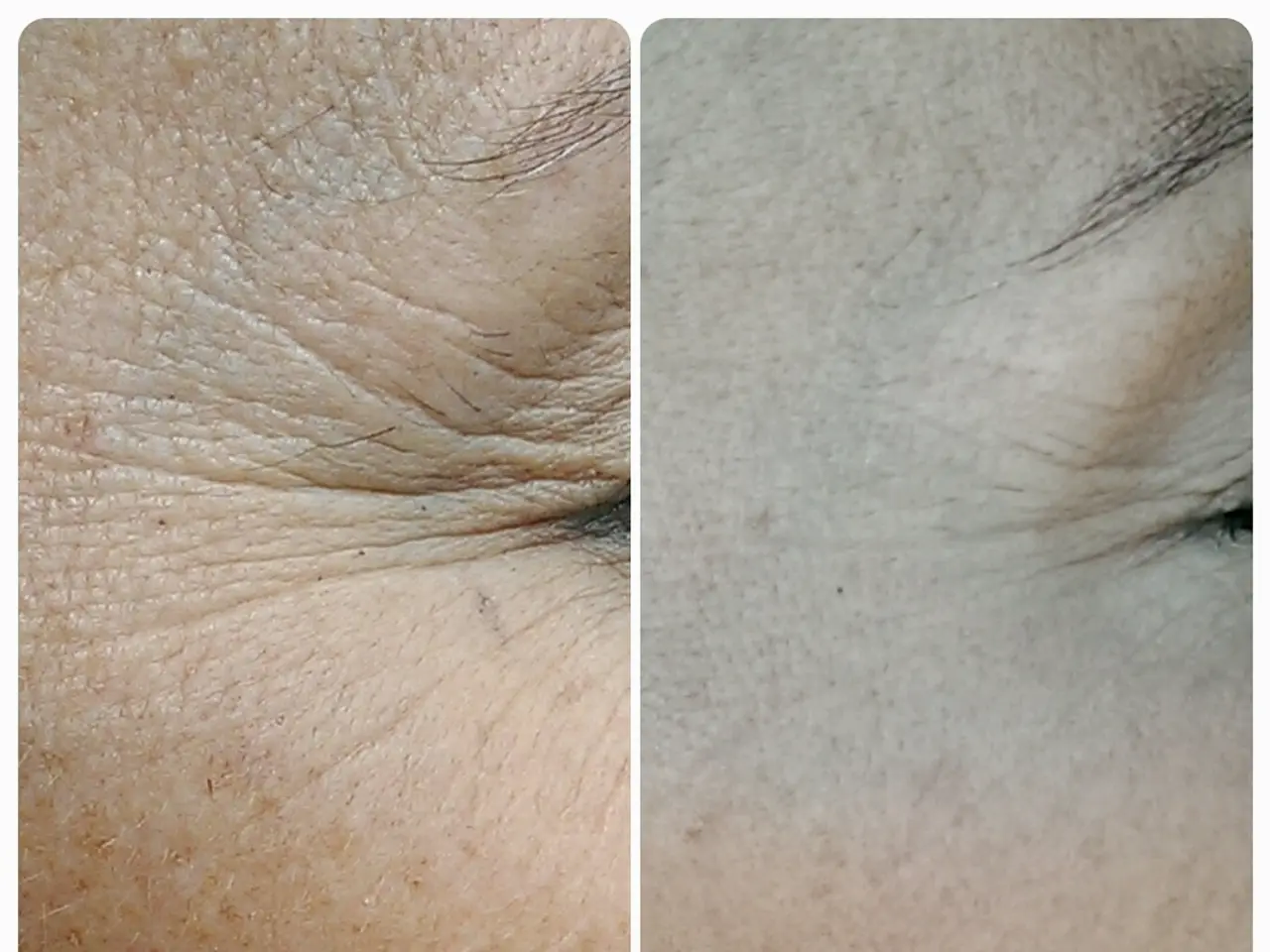Strategies for radiant skin: 11 recommendations encompassing diet, skincare, and various other methods
Hormonal fluctuations can trigger acne breakouts and changes in skin oiliness, but there are numerous ways to promote healthy, radiant skin. Here's a guide to achieving and maintaining glowing skin, covering diet, lifestyle habits, and skincare products.
Dietary Approaches
A nutritious diet plays a significant role in skin health. Prioritise drinking plenty of water—at least eight glasses daily—and consuming water-rich foods like cucumbers and watermelon to keep skin hydrated. Eat a variety of antioxidant-rich fruits and vegetables, such as berries, oranges, leafy greens, bell peppers, and broccoli, which help brighten and protect skin. Incorporate omega-3 fatty acids from sources like salmon, walnuts, flaxseeds, and chia seeds to reduce inflammation and promote a supple complexion.
Vitamin A, found in beef liver, sweet potato, spinach, carrots, and cantaloupe, promotes the growth and maintenance of healthy skin cells and may protect against skin cancer. Vitamin D, found in cod liver oil, seafood, UV-exposed mushrooms, fortified dairy milk and plant milks, and fortified breakfast cereals, may aid in wound healing, protection against sun damage, and reduction of inflammation. Vitamin E, found in wheat germ oil, sunflower seeds, almonds, sunflower oil, and peanut butter, is an antioxidant that protects against sun damage.
Supplements such as collagen peptides, vitamin E, and zinc may also support skin health if dietary intake is insufficient, but consult a healthcare professional before use.
Lifestyle Habits
Lifestyle habits that benefit skin include regular facial massage to boost blood circulation and lymphatic drainage, which supports nutrient delivery and reduces puffiness for a natural glow. Regular exfoliation removes dead skin cells to reveal fresher skin beneath, but avoid harsh scrubs that may irritate. Managing stress, getting adequate sleep, and protecting skin from excessive sun exposure are also important for maintaining skin radiance.
Skincare Products
Start with a gentle cleanser suited to your skin type that preserves your skin’s natural moisture barrier—cream cleansers for dry skin and gel cleansers for oily skin. Use serums targeting your skin needs, such as vitamin C for brightening and protection, hyaluronic acid for hydration, and niacinamide to control oil and minimize pores. Follow with a moisturizer containing ingredients like ceramides, peptides, or natural oils to lock in hydration and shield against environmental stressors.
Natural topical treatments can further enhance glow: DIY masks using honey, yogurt, or oatmeal provide gentle exfoliation and nourishment, while natural oils such as jojoba, rosehip, and argan oil offer deep hydration without clogging pores. Turmeric, with its anti-inflammatory and antioxidant properties, can reduce pigmentation and rejuvenate skin when applied carefully.
Additional Considerations
Coexisting health conditions and medications can affect skin health. Always wear SPF when using a chemical exfoliant. Behavioural factors like water intake, diet, sleep, stress, and exercise can influence skin health. When choosing a sunscreen, look for a broad spectrum, SPF 30 or above, and a product suitable for a person's skin type.
Vitamin B2 (Riboflavin), found in beef liver, fortified breakfast cereals, dairy, mushrooms, and almonds, maintains collagen levels in the skin. Vitamin C, found in citrus fruits, bell peppers, kiwi, broccoli, and strawberries, is an antioxidant that helps form the skin barrier, collagen, protect against sun damage, and reduces the risk of some skin diseases. Zinc, found in oysters, beef, crab, pork, baked beans, fortified breakfast cereals, pumpkin seeds, and chickpeas, supports skin integrity and wound healing.
Glowing skin is often associated with healthy-looking, smooth, hydrated, and evenly colored skin. Stopping smoking can help prevent premature aging, slow wound healing, skin infections, and some skin disorders, including psoriasis, and reduce the risk of squamous cell skin cancer, particularly on the lips.
By combining these dietary, lifestyle, and skincare approaches, you can create a comprehensive routine to achieve and maintain glowing, healthy skin.
- Consuming a diet rich in water, antioxidants, omega-3 fatty acids, vitamins A, D, E, B2, and C, and minerals like zinc can promote healthy, glowing skin.
- Regular facial massage, exfoliation, stress management, adequate sleep, and sun protection are crucial lifestyle habits that can boost skin radiance.
- Selecting skincare products carefully, such as gentle cleansers, targeted serums, and moisturizers that suit your skin type, can help maintain healthy, glowing skin.
- Natural topical treatments, like masks using honey, yogurt, oatmeal, or oils like jojoba, rosehip, and argan oil, can further nourish and enhance skin glow.
- Predictive science in health-and-wellness and skin-care fields suggests that behavioral factors like water intake, diet, sleep, stress, and exercise exert a significant influence on skin health.
- Adhering to a comprehensive routine that encompasses diet, lifestyle, and skincare practices, along with wearing SPF and stopping smoking, can aid in achieving and maintaining glowing, healthy skin over the long term.




